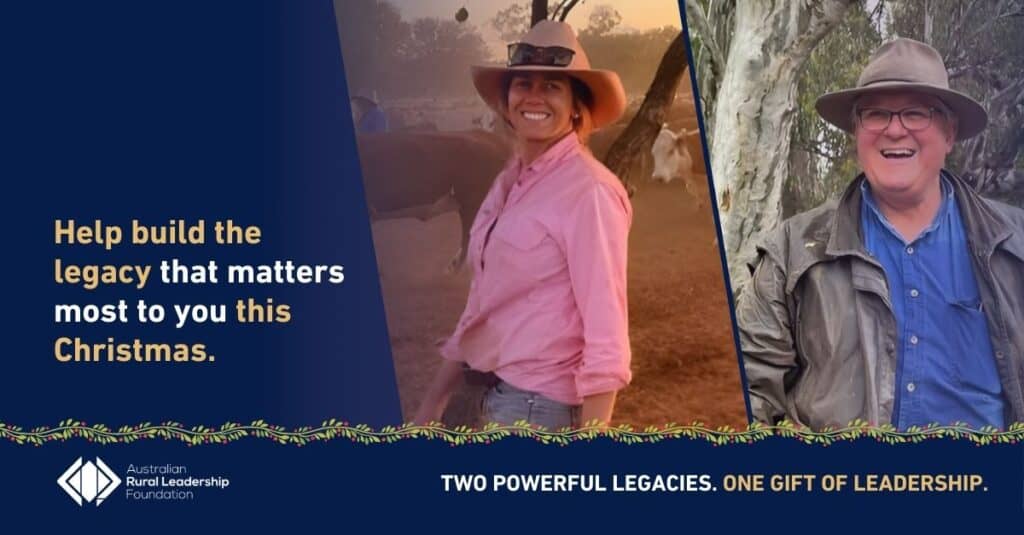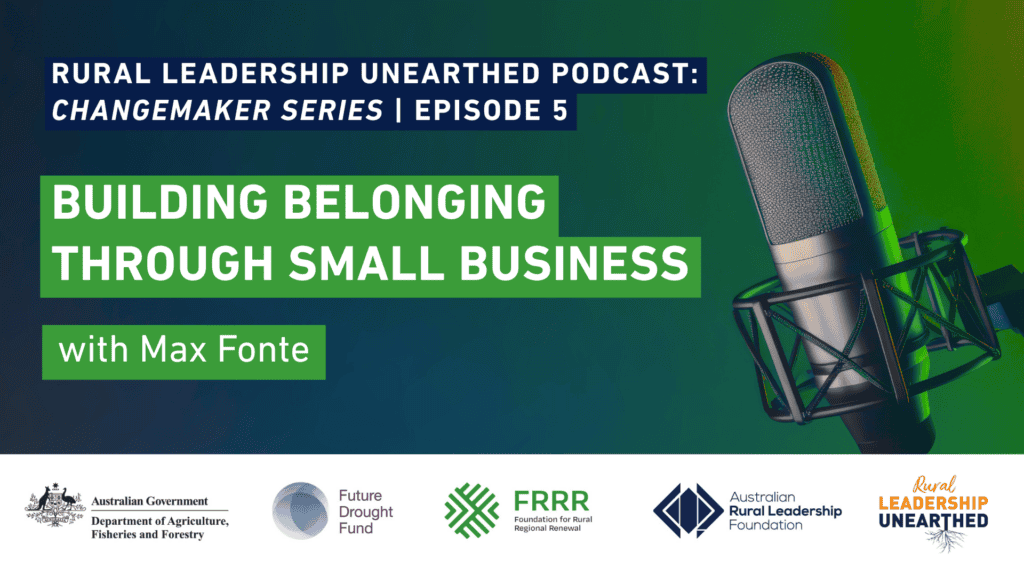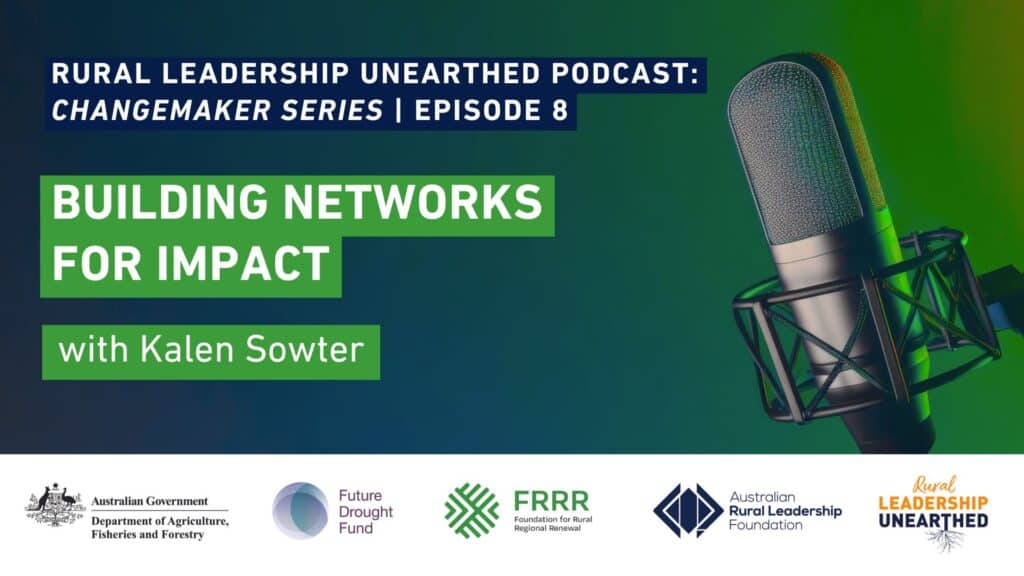Among many achievements and rich experiences through a career in corporate agribusiness, being awarded the John B. Innovation in Agriculture Scholarship is a major highlight for Tony Eyres.
The scholarship supports an international study tour and accompanies a place on the Australian Rural Leadership Foundation’s (ARLF) renowned Australian Rural Leadership Program (ARLP).
The former CEO of Grain Growers and founder of agribusiness consultancy, Rounding Up, has cultivated a long tradition of travelling, learning and pursuing knowledge. Each rich experience – especially those that have taken him overseas – have only heightened his appreciation for Australia’s productive and progressive agricultural sector and producers.
For his scholarship application, Tony drew on decades observing global trends affecting food producers and consumers. Roles with organisations like Grain Growers, the Birchip Cropping Group, Fonterra, UBS AG and Austrade informed his ambition to better connect consumer and commercial market demand with on-farm technology practices.
Noting that EU consumers offer a bellwether of demand trends for product information, while the EU pursues an agenda to minimise the adverse environmental impacts of our food chains, Tony decided to examine how we can create more transparent, sustainable food systems. Specifically, he wanted to know how existing technologies might converge to measure, monitor and manage the nutrient, water and carbon (or CNH2O) footprint of our food and fibre.

The convergence of CNH2O technologies
The global trend towards consumer expectations for more sustainable food systems brings a range of requirements and challenges across the supply chain. For Tony, it was clear that Australian agriculture and the burgeoning potential of AI, and big data analytics, were dots that could be better connected for the purposes of keeping up with the demands of our export markets.
“We need to have the technology to help farmers inside the farm gate comply with traceability demands around what carbon, water and nutrients goes into the wool and cotton we wear and the meat, grains, fruit and vegetables we eat,” Tony says.
In 2022, he used the scholarship to visit the US, Europe and the UK, where he had travelled 20 years earlier with a Churchill Fellowship – all markets where there’s significant government support behind agriculture and ag tech development.
In New York, Tony immersed himself in Climate Week which coincided with the UN General Assembly. He attended a host of seminars and sessions with ag tech companies and soaked up the proximity to policy-makers and global leaders.
“I met with businesses of all sizes and talked to a range of people about what efforts are going on to try to help farmers more easily and cost-effectively comply with knowing their carbon footprint and tracing water and nutrient use through the farming system.”
Reporting and the supply chain
On a quick stop in Ireland, Tony spoke with the head of supply chain sustainability for IBM Consulting. She shared her insights from advising big supermarket chains about the requirements around Scope 3 reporting – which takes into account a company’s indirect emissions, created by a company’s value chain.
“She really embraced what I was wanting to understand, and generously gave me her time. We discussed how supply chains are being optimised so that technology and traceability can work together to give consumers comfort; give businesses data; and give farmers a continued market for their product,” Tony says.
On to the UK, and Tony spent a two-day World Agri-Tech Innovation Summit in London “speed dating” people from different countries and industries to hear about how they are problem-solving with technology.
“Hearing big corporates present in plenary sessions about trends and consumer demand and pricing, while accounting to a consumer base about sustainable practices – it places huge imposts on business,” Tony says.
As some businesses experience the pressure to conform to unrealistic targets they may not be resourced to meet, it is inevitable that the cost and responsibility can get pushed further down the supply chain. And it often comes to rest on producers.
“The need to be seen to be doing the right thing may need to slow down because it’s not sustainable for a single resource base to provide – especially as we see a decline in farmers around the world,” Tony cautions.
“Something that resonated was a tech provider talking about the importance of a digitally connected mindset; something essential to agriculture implementing sustainable practices while creating shared commercial value for all stakeholders across the entire value chain.”
Agriculture well-placed as a custodian of natural assets
Back in Australia after his whirlwind trip, Tony brought a clear sense of the strategic approach needed to meet the challenge of capturing carbon emissions, water and nutrient use by Australian food and fibre producers.
“There is a need to position agriculture as part of the solution, not part of the problem. Farmers know their farm assets in the natural environment … it’s really important they are recognised for that role in terms of looking after habitats and water catchments.”
Describing ag tech, sustainability and climate change as “a triumvirate of complexity”, Tony delights in the potential for humans to solve problems set in motion by previous generations.
“As a race, we are incredibly innovative and we need to encourage and nurture that at every opportunity.”
While technologies like sub-surface soil sensors measuring moisture, heat, light and other data are already in use in precision agriculture with a view to increasing yields, Tony sees applications beyond the needs of an individual business.
“We are innovative and early adopters of agricultural technologies, but we have the opportunity to position ourselves as a global leader in responding to consumer demands for greater transparency around sustainable farming practices.”
While many technologies remain expensive, widespread adoption is key.
“What you can’t measure, you can’t manage – it’s a cliché, but it’s true,” Tony says.
“Data will increasingly have a monetary value. Those who can succinctly show their footprint around carbon, water and nutrients will have better access to more processors, big corporate buyers, and consumers.”

A new leadership challenge
As the new General Manager of Business Development and Partnerships with FutureFeed, Tony finds himself at a unique point of convergence between technology, sustainable food systems and data. FutureFeed was established by CSIRO in 2020 to commercialise the application of native Australian seaweeds as a feed supplement to reduce methane production in ruminants.
“I’ll be working with our existing and new licensees around the world, supplying raw seaweed to source bioactives that are formulated into a ruminant feed additive,” Tony explains.
Integral to the success of Future Feed, of course, is the robust and widespread data capturing the measurable reduction in methane emissions from ruminants as a direct result of this feed additive.
While this agri-frontier may seem a long way from the 5,500 hectare wheat and sheep farm where he grew up in Kulin, in Western Australia’s central Wheatbelt, it’s more so a natural progression. As the youngest of four, Tony had a lot of opportunity to observe his family’s progressive approach to sustainable farming and managing water in the landscape. It was also a place where others, including ag college students, came to study and learn about agriculture.
“Driving a global technology solution to mitigate methane emissions from ruminants and counter much of the negative sentiment towards a sector that is very close to my heart, is very satisfying,” Tony says.
While for many of the technologies revolutionising data capture in ag it’s still ‘watch and wait’ in terms of integration potential, Tony sees the rapid progress made in application programming interfaces (APIs) as encouraging. These increasingly enable apps to access data across operating systems or other apps and services, and could be the key to more seamless information sharing across supply chains – from farmers to end-users.
But it is with a new “digitally connected mindset” that Tony plans to focus on helping others to embrace technologies and implement more sustainable solutions within Australian farming systems. Through his extensive agribusiness networks and from his vantage point with Future Feed, Tony will cultivate collaborative relationships with leaders globally and locally around agri-tech adoption and data sharing. He is also collating his own data on the challenges and pain points felt by producers and multinationals alike in measuring inputs and meeting consumer demand. Wherever possible, he hopes to broker greater trust and knowledge-transfer between all those who have a role to play in feeding and clothing an increasingly climate-concerned, sustainability-savvy consumer base.
ARLP closes the loop
A passionate life-long-learner, Tony’s participation in Course 28 of the ARLP was part of a much longer thread.
The chance to participate in the ARLP first arose for him 20 years ago while he was at the helm of Grain Growers. While his program application had been accepted, Tony withdrew after instability impacting the grains industry meant it was not a good time to be away from his work responsibilities.
“The ARLP was unfinished business for me, and I always wanted to go back to it,” Tony says.
“To re-apply and be accepted was wonderful. The second and equally special element was the John B. Innovation in Ag scholarship. To know that there was interest in my proposed research and that others could see the importance of this study trip was encouraging. It’s been a wonderful experience, and I am very grateful to the many people that allowed me to partake in it”
The John B. Innovation in Agriculture Scholarship is a unique opportunity for a leader within the agriculture sector looking to develop their leadership capabilities and contribute to the greater good of agriculture in Australia. The Scholarship funds participation in the Australian Rural Leadership Foundation’s flagship 15-month leadership program – the Australian Rural Leadership Program. After graduating from the program, the recipient is funded to undertake an overseas study tour to enhance their contribution to innovation in agriculture.
To find out more about the John B, Innovation in Agriculture Scholarship or register your interest in the ARLP visit our website.




